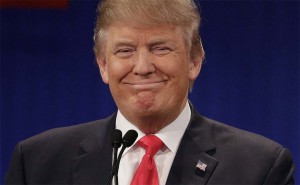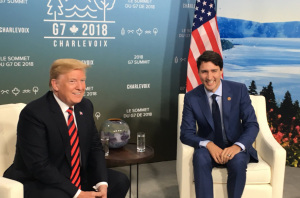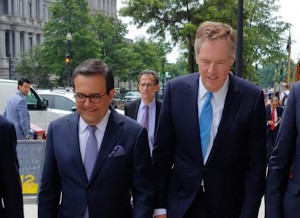
President Donald Trump said he plans to make getting a deal done with Canada very difficult because he doesn't plan to compromise — at all.
The North American Free Trade Agreement faces an uncertain future despite a tentative pact between the U.S. and Mexico that would spare Detroit carmakers from punishing tariffs on any vehicles they build in Mexico.
Most of the vehicles built in Mexico by General Motors, Ford Motor Co. and Fiat Chrysler meet the new rules of origin that are part of the tentative agreement between the U.S. and the lame-duck Mexican government, which is scheduled to leave office at the end of November.
Vehicles built in Mexico by Honda, Nissan and Toyota, however, could potentially face tariffs, according to analysts, who have reviewed the documents.
Meanwhile, the negotiators for the Trump administration failed to reach an agreement with their Canadian counterparts and their task got a lot tougher after the Toronto Star reported on President Donald Trump’s disparaging remarks about Canada and its Liberal government.
(NAFTA update faces hurdles getting approval. Click Here for the story.)
According to the Star, Trump said not making any compromises at all with Canada — and that he could not say this publicly because “it’s going to be so insulting they’re not going to be able to make a deal.”
Trump also said also said any deal would “totally on our terms,” according to The Star, and he was prepared to continue threatening to levy tariffs on vehicles made in Canada to force the Canadians to agree.
He later basically acknowledged the accuracy in a Tweet in which he thought his remarks had been made off the record during an interview with Bloomberg. The Star later said the obtained the text of interview from another source.
The Star story, however, made in more difficult to reach any kind of agreement with the Trump administration. At the same time, lack of an agreement with Canada could doom any effort to replace NAFTA with a bi-lateral agreement with Mexican government at this point.
(Click Here to see why NAFTA talks halted earlier.)

President Donald Trump and Canadian Prime Minister Justin Trudeau may be facing some difficult times ahead.
The American business community and Republicans in Congress want to see an agreement that includes all three countries. In addition, Trump’s natural allies in the fight over NAFTA, organized labor, also wants Canada included in any final agreement.
Major unions in the U.S. have fought against NAFTA for 25 years because in their view it has made it possible for U.S. companies to move factories to Mexico. In its tentative deal, Mexico agreed to rules that would require any car built in North America to have about 40-45% of its content made by workers earning $16 per hour or more if it is to qualify for a tariff cut.
In addition, Mexico has agreed to take specific legislative actions to strengthen collective bargaining. The idea being that workers who can more effectively organize are positioned to demand higher wages and better working conditions.
Trump needs labor support to push a NAFTA deal through Congress next year, especially if Democrats take the House, Politico noted. Over the weekend, AFL-CIO President Richard Trumka, however, said Canada has to be part of any deal on NAFTA. Farm groups also want Canada included.
“The three countries in North America, the economy is pretty integrated. And it’s pretty hard to see how that would work without having Canada in the deal,” Trumka said.
(To see more about the U.S., Mexico agreement on NAFTA’s auto provisions, Click Here.)
“The three countries in North America, the economy is pretty integrated. And it’s pretty hard to see how that would work without having Canada in the deal,” Trumka said during an appearance on Fox News Sunday.


Honda, Nissan & Toyota “should” face tariffs if their NA content does not meet the re-negotiated standards. Why should they be able to sneak in thru the Mexican backdoor with Asian supplied engines and parts and then claim the vehicle is made in NA? The new rules will encourage them to use NA made parts instead. I would imagine Canada would be in total agreement in this area.